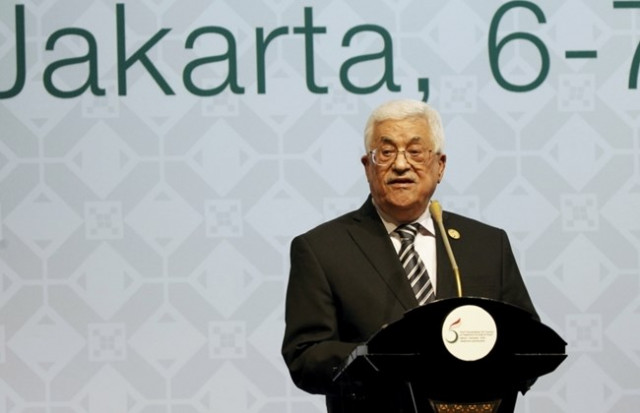Palestinian president can revoke parliamentary immunity of opponents - court
A verdict issued on Sunday which was swiftly condemned by critics within Abbas's Fatah faction

Palestinian President Mahmoud Abbas makes closing remarks at the end of the 5th Extraordinary Organisation of Islamic Cooperation (OIC) Summit on Palestinian issues in Jakarta, Indonesia on March 7, 2016. PHOTO: REUTERS
Israel angered as UNESCO adopts Jerusalem resolution
A verdict issued on Sunday which was swiftly condemned by critics within Abbas's Fatah faction and Islamist rivals, upheld his decree from 2012 when he lifted the immunity of a major rival, Mohammad Dahlan, and expelled him from Fatah. Gaza-born Dahlan is seen as a potential successor to Western-backed Abbas, 81. He now lives in self-imposed exile in Abu Dhabi as he would face corruption charges if he returned to the Palestinian territories.
"The Constitutional Court ... stated that President Abbas has full authority to cancel the immunity of any parliament member, when the legislative council is not convened," a statement published by official Palestinian news agency, WAFA, said.
Abbas opponents and analysts said the court's decision confirmed fears they raised when he formed the nine-judge panel in April, saying it would give him too much power and would effectively allow him to cancel the role of the Palestinian legislative council - the territory's parliament. The legislative council has not convened fully since the 2007 civil war that ended with Hamas taking control of the Gaza Strip when they ousted forces loyal to Abbas from the coastal enclave.
The court ruled that Abbas's 2012 decree to cancel Dahlan's immunity "had been made according to the authority afforded to the president by law". Dahlan made no immediate comment but Majed Abu Shammala, a Fatah official close to him said the court's decision reflected the political will of Abbas and not the law.
Next war in Gaza will be the last: Israeli defence minister
The ruling means that Abbas could also stop Hamas's Aziz Dweik, the speaker of the legislative council, from becoming caretaker president should Abbas die in office or resign. Hamas spokesman Sami Abu Zuhri said the group did not recognize the court or its rulings because it was a wholly Fatah entity.



















COMMENTS
Comments are moderated and generally will be posted if they are on-topic and not abusive.
For more information, please see our Comments FAQ